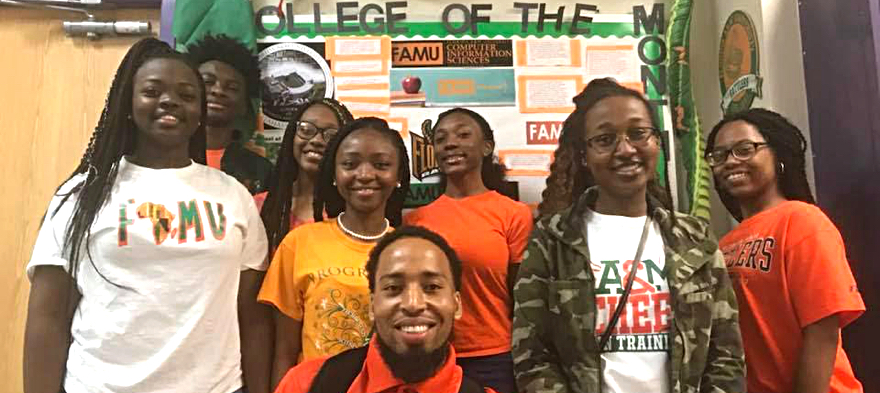
Crossroad Academy Charter School in Quincy, Florida, defies expectations. More than 90% of the school’s 530 students are Black or Hispanic, more than two-thirds qualify for free or reduced-price lunch and the school is located in an economically depressed rural county where nearly one-quarter of the residents live in poverty. Yet, Crossroad is Gadsden County’s highest performing school, outperforming district and state averages in both math and reading.
[pullquote]One key to the school’s success has been hiring young, Black teachers—particularly men[/pullquote]—who have built close-knit relationships with the school’s students and their families.
A growing body of research points to the presence of Black teachers as key to raising student achievement. In 2018, researchers Seth Gershenson and Nicholas Papageorge found that White teachers, who comprise the majority of American educators, hold lower expectations for Black students than they do for similarly situated White students. In a separate study that same year, the same authors found that Black students who have just one Black teacher in elementary school are more likely to graduate high school and enroll in college—significantly more likely if they have two Black teachers. These studies are the most recent in a larger body of research, which suggests that students of color need access to a more diverse teaching force.
Crossroad’s leadership has taken this research to heart. A majority of the school’s faculty, staff and board members are Black—it’s a proud Black-led institution. That’s not unusual for Gadsden County, where a majority (56%) of the population is Black. But what makes this school truly unique is its relationship with local historically Black college and university (HBCU) Florida Agricultural and Mechanical University (Florida A&M).
When Crossroad’s leader Kevin Forehand, an alum of Florida A&M and Gadsden County native, began his tenure as principal, the school’s student body was growing rapidly. As a result, the school needed a larger teaching force. Mr. Forehand recognized the importance of recruiting and hiring young, ambitious Black talent to teach at his school, and later developed a mentorship program between his alma mater and Crossroad Academy. Through this partnership, university staff and students help Crossroad high school students prepare for the college application process and review their application materials. In return, all Crossroad seniors apply to Florida A&M to ensure that they have at least one high-quality postsecondary option.
As a result of Mr. Forehand’s recruitment efforts, 30% of the school’s staff are Black male teachers—compared to just 2% of all teachers nationally. All of Crossroads’ male teachers are college graduates (many of Florida A&M), and some grew up in Gadsden County.
In addition to their responsibilities as educators, Crossroad teachers serve as local mentors who help students feel affirmed and challenged to pursue academic excellence. Teachers at Crossroad recognize that without a postsecondary degree options are limited for their students—particularly within Gadsden County.
This drives their commitment to ensure that every student is ready for college or a career upon graduation. As one teacher explained, “I grew up in Gadsden County, and like my students, I didn’t grow up in an environment where I knew college was an option or that there was a real future beyond high school graduation. Instead, Crossroad offers that environment.”
The partnership with Florida A&M is particularly important given that rural schools like Crossroad face a unique set of human capital challenges, especially when trying to build a diverse teacher workforce. The school competes for staff with neighboring urban cities like Tallahassee, which offer higher salaries and greater social and community amenities. As a result, Crossroad has experienced high rates of teacher turnover.
[pullquote]Crossroad demonstrates that making an explicit commitment to a diverse teaching staff is an important factor that can drive success in rural schools.[/pullquote] This year, 61% of Crossroad students were proficient or higher in math, while 63% met the same benchmark in reading. These results outperform the local school district by a large margin for similar students, and match or exceed statewide averages.
Policymakers, educators and philanthropists who want to make a real difference in the lives of our nation’s most vulnerable students should look to examples like Crossroad to guide future action and investment in rural schools. As one parent who sends their child to Crossroad told me, “Anyone that goes to Crossroad, they’re going to be ready for the world.”
Brandon Lewis is an analyst at Bellwether Education Partners, a nonprofit organization focused on changing education and life outcomes for underserved children. He is the co-author of a new brief on the importance of schools' role in preventing incarceration. Previously, Brandon was an education policy manager with the National Urban League where he worked to shape the League’s educational equity agenda and analysis of the Every Student Succeeds Act.
The fight for educational equity has never been just about schools. The real North Star for this work is providing opportunities for each child to thrive into adulthood. This means that our advocacy...
Your donation will support the work we do at brightbeam to shine a light on the voices who challenge decision makers to provide the learning opportunities all children need to thrive.
Ed Post is the flagship website platform of brightbeam, a 501(c3) network of education activists and influencers demanding a better education and a brighter future for every child.
© 2020–2024 brightbeam. All rights reserved.